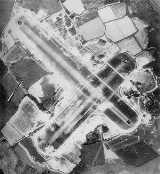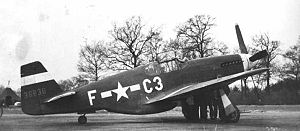
RAF Staplehurst
Encyclopedia

World War II
World War II, or the Second World War , was a global conflict lasting from 1939 to 1945, involving most of the world's nations—including all of the great powers—eventually forming two opposing military alliances: the Allies and the Axis...
airfield in Kent
Kent
Kent is a county in southeast England, and is one of the home counties. It borders East Sussex, Surrey and Greater London and has a defined boundary with Essex in the middle of the Thames Estuary. The ceremonial county boundaries of Kent include the shire county of Kent and the unitary borough of...
, England
England
England is a country that is part of the United Kingdom. It shares land borders with Scotland to the north and Wales to the west; the Irish Sea is to the north west, the Celtic Sea to the south west, with the North Sea to the east and the English Channel to the south separating it from continental...
. The airfield is located approximately 1 miles (1.6 km) northeast of Staplehurst
Staplehurst
Staplehurst can mean:* Staplehurst in England* RAF Staplehurst, a World War II airfield in England* Staplehurst railway station* Staplehurst rail crash, a railway accident in 1865* Staplehurst, Nebraska, a small village in the United States...
; about 38 miles (61.2 km) southeast of London
London
London is the capital city of :England and the :United Kingdom, the largest metropolitan area in the United Kingdom, and the largest urban zone in the European Union by most measures. Located on the River Thames, London has been a major settlement for two millennia, its history going back to its...
Opened in 1943, Staplehurst was a prototype for temporary Advanced Landing Ground
Advanced Landing Ground
Advanced Landing Ground was the term given to the temporary advance airfields constructed by the Allies during World War II in support of the invasion of Europe...
s built in France after D-Day, and as the Allied forces moved east across France
France
The French Republic , The French Republic , The French Republic , (commonly known as France , is a unitary semi-presidential republic in Western Europe with several overseas territories and islands located on other continents and in the Indian, Pacific, and Atlantic oceans. Metropolitan France...
and Germany
Germany
Germany , officially the Federal Republic of Germany , is a federal parliamentary republic in Europe. The country consists of 16 states while the capital and largest city is Berlin. Germany covers an area of 357,021 km2 and has a largely temperate seasonal climate...
. It was used by the Royal Air Force, Canadian and the United States Army Air Forces. It was closed in September 1944.
Today the airfield is a mixture of agricultural fields with no recognizable remains, except a memorial now near the site.
Overview
The USAAF Ninth Air Force required several temporary Advanced Landing GroundAdvanced Landing Ground
Advanced Landing Ground was the term given to the temporary advance airfields constructed by the Allies during World War II in support of the invasion of Europe...
(ALG) along the channel coast prior to the June 1944 Normandy invasion
Operation Overlord
Operation Overlord was the code name for the Battle of Normandy, the operation that launched the invasion of German-occupied western Europe during World War II by Allied forces. The operation commenced on 6 June 1944 with the Normandy landings...
to provide tactical air support for the ground forces landing in France
France
The French Republic , The French Republic , The French Republic , (commonly known as France , is a unitary semi-presidential republic in Western Europe with several overseas territories and islands located on other continents and in the Indian, Pacific, and Atlantic oceans. Metropolitan France...
.
Staplehurst airfield was one of the first batch of ten ALGs approved for construction which started in January 1943. All had 1 March 1943 as the target date for completion but this was too optimistic in the prevailing wet winter weather conditions and the airfield was not ready for occupation until later in the spring.
It was a prototype for the type of temporary airfield which would be built in France after D-Day, when the need advanced landing fields would become urgent as the Allied forces moved east across France
France
The French Republic , The French Republic , The French Republic , (commonly known as France , is a unitary semi-presidential republic in Western Europe with several overseas territories and islands located on other continents and in the Indian, Pacific, and Atlantic oceans. Metropolitan France...
and Germany
Germany
Germany , officially the Federal Republic of Germany , is a federal parliamentary republic in Europe. The country consists of 16 states while the capital and largest city is Berlin. Germany covers an area of 357,021 km2 and has a largely temperate seasonal climate...
. It was originally planned to support light bombers and thereby would need a bomb store near the site. However, in a review of airfield building plans, this original requirement was dropped so Staplehurst was of similar specification to other ALGs in the district.
The airfield consisted of two wire-mesh Sommerfeld Track runways, the main being 4200 ft (1,280.2 m) aligned 10/28 and a secondary of 3300 ft (1,005.8 m) at 01/19. Pierced Steel Planking (PSP) was also used in the construction of the hardstands and perimeter track along with several temporary hangars of wood and canvas.
Tents were used for billeting and also for support facilities; an access road was built to the existing road infrastructure; a dump for supplies, ammunition, and petrol drums, along with a drinkable water and minimal electrical grid for communications and station lighting.
Royal Canadian Air Force use
It was not until early August 1943 that use was made of Staplehurst for combat flying when the Supermarine SpitfireSupermarine Spitfire
The Supermarine Spitfire is a British single-seat fighter aircraft that was used by the Royal Air Force and many other Allied countries throughout the Second World War. The Spitfire continued to be used as a front line fighter and in secondary roles into the 1950s...
s of Nos. 401, 411 and 412 Squadrons, RCAF, arrived from RAF Kenley
RAF Kenley
The former Royal Air Force Station Kenley, more commonly known as RAF Kenley was a station of the Royal Flying Corps in World War I and the RAF in World War II. It is located near Kenley, London, England.-History:...
. Although these units engaged in operations almost immediately, their presence was more in the way of a test of the ALG to see if any short-comings would be revealed. As at most other Kent ALGs, the most serious problem was the tendency of the Sommerfeld Track to ruck up and damage tail wheels. When the Canadians moved out to the permanent airfield at RAF Biggin Hill in mid-October, Staplehurst airfield was returned to a caretaker, standby status.
USAAF use
Staplehurst was known as USAAF Station AAF-413 for security reasons by the USAAF during the war, and by which it was referred to instead of location. It's USAAF Station Code was "SH".An early American arrival by air occurred on 4 April 1944 when a 453rd Bomb Group Consolidated B-24 from RAF Old Buckenham
RAF Old Buckenham
RAF Old Buckenham is a former World War II airfield in England. The field is located SE of Attleborough in Norfolk, and is currently in civilian use as Old Buckenham Airport.-USAAF use:...
landed with No. 4 engine out. It was duly repaired and flown out.
363d Fighter Group
Staplehurst was chosen to house one of the Ninth Air Force's two P-51B Mustang fighter groups (The other being the 354th Fighter Group), and the 363d Fighter Group moved in to Staplehurst on 14 April from RAF RivenhallRAF Rivenhall
RAF Station Rivenhall is a former World War II airfield in Essex, England. The airfield is located approximately south-southeast of Braintree; about northeast of London...
. The group consisted of the following operational squadrons and fuselage codes:
- 380th Fighter Squadron (A9)
- 381st Fighter Squadron (B3)
- 382d Fighter Squadron (C3)
Previous missions of the 363d were chiefly flown in support of Eighth Air Force
Eighth Air Force
The Eighth Air Force is a numbered air force of the United States Air Force Global Strike Command . It is headquartered at Barksdale Air Force Base, Louisiana....
heavy bomber (B-17, B-24) missions and had not fared particularly well. Its first mission from Staplehurst was also not a happy occasion as three P-51s lost in bad weather went into the sea while another crashed returning to base. Then, on 22 April four of its Mustangs failed to return and on the 29th another four were lost and yet more on 24 May.
Morale was lifted on 28 May when, in an air battle near Gardelegen
Gardelegen
Gardelegen is a town in Saxony-Anhalt, Germany. It is situated on the right bank of the Milde, 20 m. W. from Stendal, on the main line of railway Berlin-Hanover....
, 16 enemy aircraft were claimed and 11 credited as shot down for the loss of only two P-51s and one of these was as the result of a collision with a P-47. Another seven enemy aircraft were claimed as a result of action on 30 May.
In the two weeks following D-Day
D-Day
D-Day is a term often used in military parlance to denote the day on which a combat attack or operation is to be initiated. "D-Day" often represents a variable, designating the day upon which some significant event will occur or has occurred; see Military designation of days and hours for similar...
, the 363rd experienced the most fruitful period of its service in the European Theater of Operations
European Theater of Operations
The European Theater of Operations, United States Army was a United States Army formation which directed U.S. Army operations in parts of Europe from 1942 to 1945. It referred to Army Ground Forces, United States Army Air Forces, and Army Service Forces operations north of Italy and the...
when patrols over France brought it actions with a total of 19 confirmed victories. However, a similar number of Mustangs were lost, albeit mostly to ground fire.
During operations from Staplehurst, the group was credited with 41 victories but lost 43 of its own aircraft in the process.
Another lame duck arrived on 28 June when a battle-damaged 489th Bomb Group Liberator from RAF Halesworth
RAF Halesworth
RAF Halesworth is a former World War II airfield in England. The field is west of Southwold in Suffolk.-USAAF use:Halesworth was built in 1942–1943 and was intended for use as a bomber station. It was built as a bomber station, with a 6,000 ft. main runway and two secondary runways of...
that put down in a hurry. Two days later, the 363rd was alerted for movement to the Continent, its new base being the airfield at Maupertus (ALG A-15), near Cherbourg.

